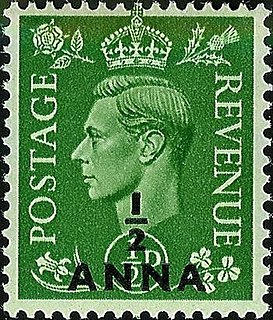Related Research Articles

A post office is a public facility that provides mail services, such as accepting letters and parcels, providing post office boxes, and selling postage stamps, packaging, and stationery. Post offices may offer additional services, which vary by country. These include providing and accepting government forms, and processing government services and fees. The chief administrator of a post office is called a postmaster.

Indian postal systems for efficient military and governmental communications had developed long before the arrival of Europeans. When the Portuguese, Dutch, French, Danish and British conquered the Marathas who had already defeated the Mughals, their postal systems existed alongside those of many somewhat independent states. The British East India Company gradually annexed the other powers on the sub-continent and brought into existence a British administrative system over most of modern-day India, with a need to establish and maintain both official and commercial mail systems.

A money order is a payment order for a pre-specified amount of money. As it is required that the funds be prepaid for the amount shown on it, it is a more trusted method of payment than a cheque.

India Post is a government operated postal system in India, which is under the jurisdiction of Department of Post, Ministry of Communications of the Government of India. Generally called "the Post Office" in India, it is the most widely distributed postal system in the world. Warren Hastings had taken initiative under East India Company to start the Postal Service in the country in 1766. It was initially established under the name "Company Mail". It was later modified into a service under the Crown in 1854 by Lord Dalhousie. Dalhousie introduced uniform postage rates and helped to pass the India Post Office Act 1854 which significantly improved upon 1837 Post Office act which had introduced regular post offices in India. It created the position Director General of Post for the whole country.
Zubeida Agha was among the first Pakistani Modern Artists. After the creation of Pakistan in 1947, she was the first artist to hold an exhibition of her paintings. She helped bring the modern idiom to Pakistan.

A postal order or postal note is a type of money order usually intended for sending money through the mail. It is purchased at a post office and is payable at another post office to the named recipient. A fee for the service, known as poundage, is paid by the purchaser. In the United States, this is known as a postal money order. Postal orders are not legal tender, but a type of promissory note, similar to a cheque.

The United Kingdom was the first country in the world to issue postal orders on 1 January 1881. They were the brainchild of the president of the Birmingham Chamber of Commerce, John Skirrow Wright which was to enable poorer people to buy goods and services by post, as they were unlikely to have bank accounts. The rich had bank accounts and could write cheques. A delegation of the Birmingham Chamber went to the annual meeting of chambers of commerce in London and John Skirrow Wright presented the idea, complete with all the details on how it would work including all the postal order values proposed. At first London bankers were against the idea, thinking it would affect their businesses, and the idea was rejected. However, eventually, the bankers realised that the people who would use postal orders were not their customers and therefore no threat to their business. Consequently, at the Annual Meeting a year later John Skirrow Wright presented the idea again and this time it was accepted and the postal order system was started exactly as Skirrow Wright and Birmingham Chamber had proposed.
Pošta Srbije is the national postal service of Serbia, with the headquarters in Belgrade. Public postal service was first introduced in Serbia in 1840. The first stamp was printed in 1866. In 1874 it founded the Universal Postal Union together with 21 other countries.
Pakistan Post is a state enterprise which functions as Pakistan's primary and largest postal operator. 49,502 employees through a vehicle fleet of 5,000 operate traditional "to the door" service from more than 13,419 post offices across the country, servicing over 50 million people. Pakistan Post operates under the autonomous "Postal Services Management Board" to deliver a full range of delivery, logistics and fulfillment services to customers. In addition to its traditional role, Pakistan Post also offers services such as Postal Life Insurance and Pakistan Post Savings Bank. It also operates services on behalf of the federal and provincial governments, by acting as a collection point for tax and utility bills.

The postage stamps and postal history of Armenia describes the history of postage stamps and postal systems in Armenia. Czarist Russian postmarks and stamps were in used in the territory of Armenia from 1858. The early postmarks were composed of dots in different shapes. Dated postmarks with city names soon followed. Many counterfeit postmarks are known. From 1909 until 1918 a few Russian stamps were overprinted identifying the Armenian Post. The Armenian letters H & P are intertwined, representing the initials of hai post, the Armenian Post Office.

Bashir Mirza, also known as BM, was a Pakistani painter artist.
Postal orders are currently issued in Gibraltar by the Royal Gibraltar Post Office.

Postage stamps of Pakistan are those issued since Pakistan's independence in 1947. Pakistan Post has issued more than 600 sets and singles totalling more than 1300 stamps. Immediately after the independence of Pakistan in 1947, the new Pakistan government was preoccupied with setting up the government so British Indian stamps continued in use without an overprint as was the practice in other countries.

Nickelodeon Pakistan or Nick Pakistan, is a pay Pakistani television channel. It is the Pakistani feed of Nickelodeon, which is operated by domestic media company ARY Group's Digital Network subsidiary under a brand licensing and programming agreement with ViacomCBS Networks EMEAA. The network transmits over the AsiaSat 7 satellite to cable and satellite viewers in Pakistan and features some portions of the schedule dubbed or subtitled in Urdu, along with some content directly imported from its Indian sister network. It also occasionally licenses Western market children's films.

The Royal Gibraltar Post Office is the postal services in the British overseas territory of Gibraltar. It is currently a department within the Government of Gibraltar.
This is a survey of the postage stamps and postal history of Muscat and Oman, including the present day Sultanate of Oman.
Emirates Post is the official postal operator for the United Arab Emirates. It is a subsidiary of Emirates Post Group.

British postal agencies in Eastern Arabia issued early postage stamps used in each of Abu Dhabi, Bahrain, Dubai, Kuwait, Muscat and Qatar. Muscat and Dubai relied on Indian postal administration until 1 April 1948 when, following the Partition of India, British agencies were established there. Two agencies were opened in Qatar: at Doha and Umm Said. In Abu Dhabi, an agency was opened on Das Island in December 1960 and in Abu Dhabi City on 30 March 1963. The agencies also supplied stamps to Bahrain until 1960; and to Kuwait during shortages in 1951–53.